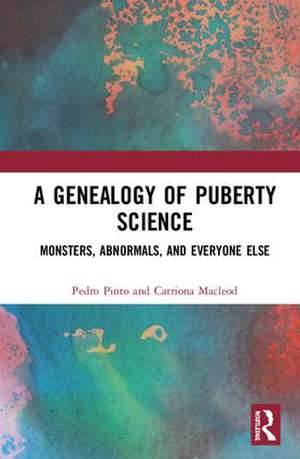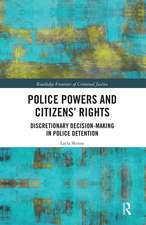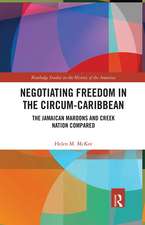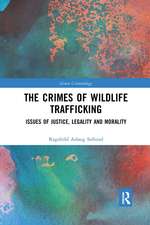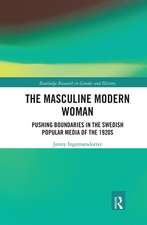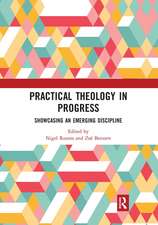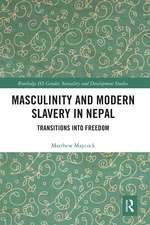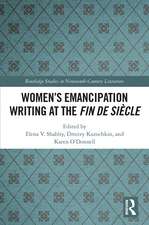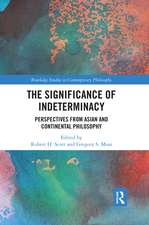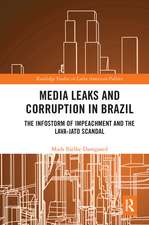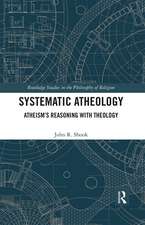A Genealogy of Puberty Science: Monsters, Abnormals, and Everyone Else
Autor Pedro Pinto, Catriona Macleoden Limba Engleză Hardback – 21 feb 2019
Offering a critical inquiry into the epistemological and political roots of our present pubertal complex, this book breaks the almost complete silence concerning puberty in critical theories and research about childhood and adolescence. Most strikingly, the book highlights the failure of ongoing medical debates on early puberty to address young people’s sexual and reproductive embodiment and citizenships.
A Genealogy of Puberty Science will be of great interest to academics, researchers and postgraduate students in the fields of child and adolescent health research, critical psychology, developmental psychology, health psychology, feminist and gender studies, medical history, science and technology studies, and sexualities and reproduction studies.
| Toate formatele și edițiile | Preț | Express |
|---|---|---|
| Paperback (1) | 272.43 lei 6-8 săpt. | |
| Taylor & Francis – 30 sep 2020 | 272.43 lei 6-8 săpt. | |
| Hardback (1) | 1000.27 lei 6-8 săpt. | |
| Taylor & Francis – 21 feb 2019 | 1000.27 lei 6-8 săpt. |
Preț: 1000.27 lei
Preț vechi: 1219.84 lei
-18% Nou
Puncte Express: 1500
Preț estimativ în valută:
191.43€ • 199.11$ • 158.03£
191.43€ • 199.11$ • 158.03£
Carte tipărită la comandă
Livrare economică 14-28 aprilie
Preluare comenzi: 021 569.72.76
Specificații
ISBN-13: 9781138295391
ISBN-10: 1138295396
Pagini: 244
Dimensiuni: 156 x 234 x 14 mm
Greutate: 0.45 kg
Ediția:1
Editura: Taylor & Francis
Colecția Routledge
Locul publicării:Oxford, United Kingdom
ISBN-10: 1138295396
Pagini: 244
Dimensiuni: 156 x 234 x 14 mm
Greutate: 0.45 kg
Ediția:1
Editura: Taylor & Francis
Colecția Routledge
Locul publicării:Oxford, United Kingdom
Public țintă
Postgraduate and ProfessionalCuprins
1. Introduction: Towards a history of the present
PART 1 PRECOCIOUS LITTLE MONSTERS
2. Child monstrosity and the dilemma of nature
3. The monster, the modest girl, and the masturbating boy
4. Accounting for the mature-immature body
PART 2 FROM BIOLOGICAL TO CULTURAL MONSTROSITIES
5. From the world of the naturalists to the first population studies
6. The biosocial reconfigured: Puberty onset and the emergence of epidemiological risk
PART 3 THE SURVEILLANCE OF ALL
7. A most dangerous condition: Puberty science and the surveillance of all
8. The birth of the ‘normal’ pubertal body (and its dilemmas)
9. Conclusion: Puberty in crisis
PART 1 PRECOCIOUS LITTLE MONSTERS
2. Child monstrosity and the dilemma of nature
3. The monster, the modest girl, and the masturbating boy
4. Accounting for the mature-immature body
PART 2 FROM BIOLOGICAL TO CULTURAL MONSTROSITIES
5. From the world of the naturalists to the first population studies
6. The biosocial reconfigured: Puberty onset and the emergence of epidemiological risk
PART 3 THE SURVEILLANCE OF ALL
7. A most dangerous condition: Puberty science and the surveillance of all
8. The birth of the ‘normal’ pubertal body (and its dilemmas)
9. Conclusion: Puberty in crisis
Notă biografică
Pedro Pinto is an independent science and technology studies scholar from Lisbon. His previous research work focused on post-feminist discourse, embodiment, and the industrialisation of sexual and gender difference.
Catriona Ida Macleod is Distinguished Professor of Psychology, SARChI Chair of Critical Studies in Sexualities and Reproduction at Rhodes University, South Africa, and editor-in-chief of Feminism & Psychology.
Catriona Ida Macleod is Distinguished Professor of Psychology, SARChI Chair of Critical Studies in Sexualities and Reproduction at Rhodes University, South Africa, and editor-in-chief of Feminism & Psychology.
Recenzii
"Pinto and Macleod not only show the gaps in the scientific construction of ‘early puberty’ but also these instigate and rely upon ideological tropes of gender and racialized differences, both intersected by class. Not only is this a really important work of scholarship in its genealogical analysis of original historical documents, but the emerging critique convincingly highlights, through the attention to the so-called crisis in puberty, how science masks its own ambiguities at the expense of normalizing and pathologizing the pubertal child and her/his parents. The most supposedly natural and biological of developmental processes, puberty, is so rendered only by most unnatural knowledge generation practices. Pinto and Macleod take the specific example of puberty and brilliantly show how it exemplifies and illuminates wider axes and processes governing the management of young bodies and minds."
Erica Burman, Professor in the Manchester Institute of Education, The University of Manchester; author of Deconstructing Developmental Psychology.
"This book is a real tour de force – an eloquent, thought-provoking and detailed genealogical analysis of puberty science. It traces the way that medical science gradually got to grips with the phenomenon of puberty, and, especially the threats it was seen to pose to social and moral order. Its focus on ‘precocious puberty’ traces a historical story of the successive ways in which puberty has been problematized. It is elegantly drawn, and highly informative."
Wendy Stainton Rogers, Emeritus Professor, The Open University; author of Stories of Childhood: Shifting Agendas of Child Concern.
"Meticulously researched and written with much gusto, this book provides a gripping account of the history of pubertal science. Filling a major gap in Foucault’s account of the history of modern sex, it demonstrates genealogy’s enduring importance in addressing
Erica Burman, Professor in the Manchester Institute of Education, The University of Manchester; author of Deconstructing Developmental Psychology.
"This book is a real tour de force – an eloquent, thought-provoking and detailed genealogical analysis of puberty science. It traces the way that medical science gradually got to grips with the phenomenon of puberty, and, especially the threats it was seen to pose to social and moral order. Its focus on ‘precocious puberty’ traces a historical story of the successive ways in which puberty has been problematized. It is elegantly drawn, and highly informative."
Wendy Stainton Rogers, Emeritus Professor, The Open University; author of Stories of Childhood: Shifting Agendas of Child Concern.
"Meticulously researched and written with much gusto, this book provides a gripping account of the history of pubertal science. Filling a major gap in Foucault’s account of the history of modern sex, it demonstrates genealogy’s enduring importance in addressing
Descriere
A Genealogy of Puberty Science explores the modern invention of puberty as a scientific object. Drawing on Foucault’s genealogical analytic, the authors trace the birth of puberty science in the early 1800s and follow its expansion and shifting discursive frameworks over the course of two centuries.
